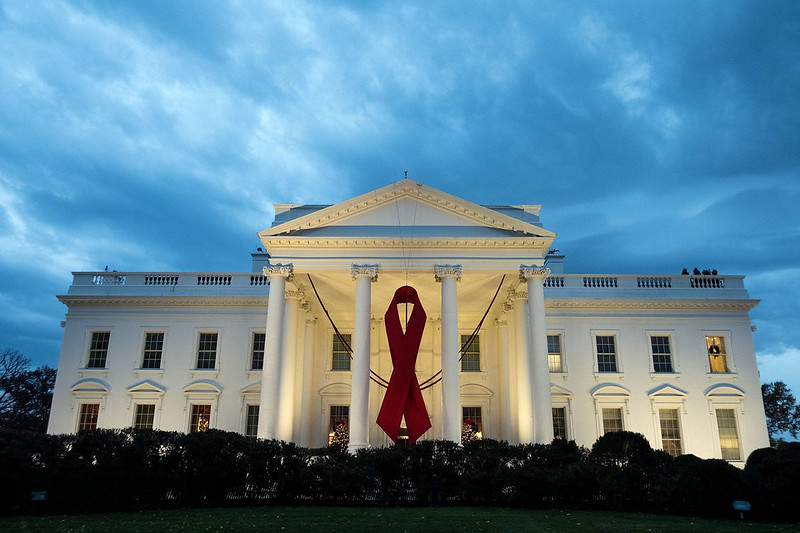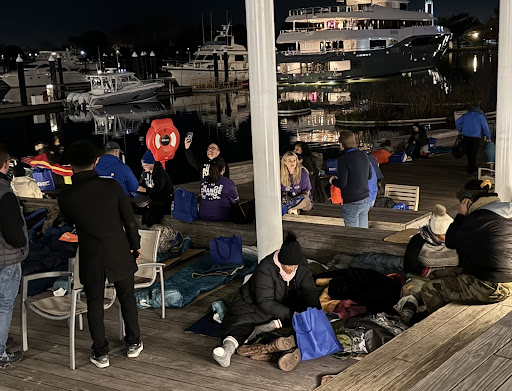In honor of World AIDS Day on December 1, D.C. community members joined together at the Thurgood Marshall Center in the Shaw neighborhood to share their experiences with HIV/AIDS by spreading awareness of the stigmas surrounding AIDS.
Artists and performers shared poems written by victims lost to AIDS, from the anthology Persistent Voices.

The anthology, assembled by Phillip Clark, president of the Rainbow History Project, preserves the voices of poets who have been lost to HIV/AIDS, allowing them to maintain a voice in the movement to stop AIDS, even after their death.
Clark said he put the anthology together to honor those who have passed away due to HIV/AIDS by celebrating their works and showing the cultural impact of AIDS on artistic voices.
“These thoughts can get easily lost if they’re not published or performed,” said Clark. “There has to be a constant effort to keep the facts of our lives and truths of our lives in front of an audience.”
Four of the poets died between 2005 and the anthology’s publication in 2010. “Don’t forget what has gone before,” said Clark.
The event was hosted by D.C.’s FOX 5 reporter Roby Chavez, who, as an openly gay man who is HIV positive, shared his support for the fight against AIDS. He introduced 10 readers and performers at the Thurgood Marshall Center who shared poems they had personally chosen from the anthology, and shared with the audience what the poems meant to them. The poems had many different themes, from death to sexuality; some humorous, and some more serious, some exploring AIDS and others, life itself.
Clarence Fluker read a poem called Heart Beats in honor of his uncle.

“Ten years ago, my uncle died and I can always touch his picture, but never feel his heart beat,” he said.
Fluker tried to reverse stereotypes of homosexuality by also reading a poem that he felt many would just see as sexual if they did not consider it more closely.
“Normally people think about two men or two women having sex. What’s not seen or portrayed is the emotion of love between them,” said Fluker.
Timur Tugberk, who is not himself infected with HIV/AIDS, expressed his feelings about being involved with the AIDS movement. He said that by talking with and becoming close to those with AIDS, he realized that he is not afraid anymore and wants to help to increase community awareness.
“I really want to bridge the stigma between HIV positive and negative people in our community,” Tugberk said.
The D.C. Center event was hosted by Us Helping Us, Ganymede Arts, and the Vaccine Research Center. During the event, these organizations shared with the audience ways to become involved with AIDS prevention in the District.
The D.C. Center hosts Packing Parties, where volunteers make safe sex kits that are supplied to bars and clubs in the D.C. area.
“It’s a good way to get the message of safe sex out there,” said Brandon Corbin, who works at the D.C. Center.
The D.C. Center is also launching an HIV testing program, and urges volunteers to help with HIV counselling, referrals, and other related tasks. The center also helps organizations such as churches set up HIV testing on site, and spreads awareness about HIV/AIDS prevention in D.C.
A representative from the D.C. Center told his story about taking part in an HIV vaccination study, a controversial subject for many.
He came from a military Morman family that was involved with volunteering. When he told his family he was thinking of taking part in the study, they said they couldn’t let him risk his life that way.
But he thought, “if not me, then who?” and called to volunteer for the study. He wasn’t sure at first whether or not he would actually be induced with the vaccine or instead a placebo, but he received the vaccine in both arms.
The vaccine did not work the way scientists had hoped, but he felt that he had played an important role in AIDS research. He urged the audience to weigh the risks of being injected with an HIV vaccine, but to also consider the impact that they could have on the fight against AIDS by volunteering for a vaccine research study.
Antonio Pineda, who read two poems in Spanish that were then translated into English summed up the emotions of the event in just a few words.
“For those who have lost a friend, this is very important to them,” said Pineda.
Copies of the book Persistent Voices were sold at the event for $10, with 20 percent of the proceeds benefitting the Penn Fund for Writers and Editors with AIDS







